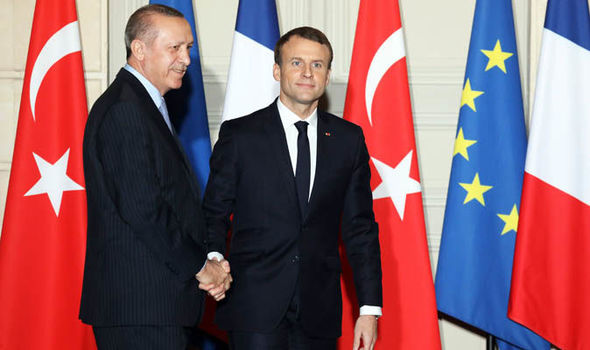The Turkish leader’s visit to France last week to jump-start a long-stalled EU negotiation process and open a new chapter in the tumultuous relationship stumbled into a spectacular debacle in Paris.
If President Recep Tayyip Erdogan planned for a diplomatic victory from the half-day working trip, the result could not have been more disappointing.
Hosting French President Emmanuel Macron shut down the prospect for Turkey’s full-fledged membership to the union, an objective sought by aspiring Turks for more than half a century.
“For relations with the European Union, it is clear that recent developments and choices allow no progress in the process,” the French president said in candid terms.
“We should … see if we cannot rethink this relationship, not in the framework of the (EU) integration process, but perhaps a cooperation, a partnership,” he noted, according to Associated Press, pointing to a dim prospect of the full membership after the breakdown of democracy and corrosion of the rule of law in Turkey.
Whether it was a carefully articulated statement or an unwitting, off-the-script remark emerged during the press conference, his blunt comments signify a change of heart on the side of Europeans toward Turkey’s efforts to join the union.
President Erdogan, on his behalf, voiced exasperation over the lack of light at the end of the tunnel.
“This is seriously exhausting us. Maybe this will force us to take a decision,” the Turkish leader said, reiterating his longstanding threat of walking away from the EU process if things do not augur well.
Mr. Erdogan’s France visit appears to be a watershed in the history of often turbulent and shifting relations between Turkey and the EU.
“Despite Erdogan’s meeting with Macron was held in a good atmosphere, the latter dared to say that such a scenario was no longer on the agenda, confessing that probably the EU has not always frankly and clearly addressed the issue with Turkey, especially when it said that all was possible as it was not,” Jean Marcou, Director of International Relations at France’s prestigious Sciences Po Grenoble, told The Globe Post Turkey.
Offering a snapshot of the dismal state of relations, he said only three chapters of the negotiation process have been opened since 2011.
“But two of them,” he underlined, “were opened in the special context of the migration crisis in Europe in 2015-2016, by the controversial Migration Pact inked in April 2016 by Turkey and the EU.”
Adding to the gloom, the progress reports on the state of Turkey’s candidacy by the European Commission have become increasingly critical and even stirred up tension between two sides, with Ankara erupting in swelling anger over what it said Brussels’ meddling in its internal affairs.
The debate swung back into “partnership” from “full membership,” a monumental shift punctuated by the seismic changes in Turkey’s body politic. “The strategic partnership” for Turkey was a concept long nursed by German Chancellor Angela Merkel when she first vaulted to power in Berlin in 2005.
Ankara, however, was cold to the proposal. And it was a promising time period when Turkey embarked on an ambitious, novel reform period to improve its democratic outlook.
The poor records on democracy front at home haunted the Turkish president in Paris as he plunged into a tense exchange with a French journalist. It further dented his credibility, defined the low moment of the visit plagued by broad-line disagreements between Turkey and France over Ankara’s place in Europe.




Comments are closed.